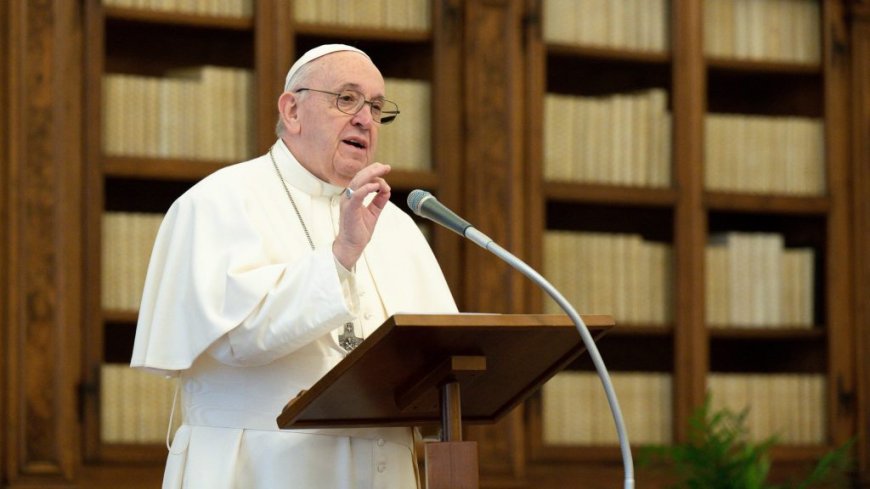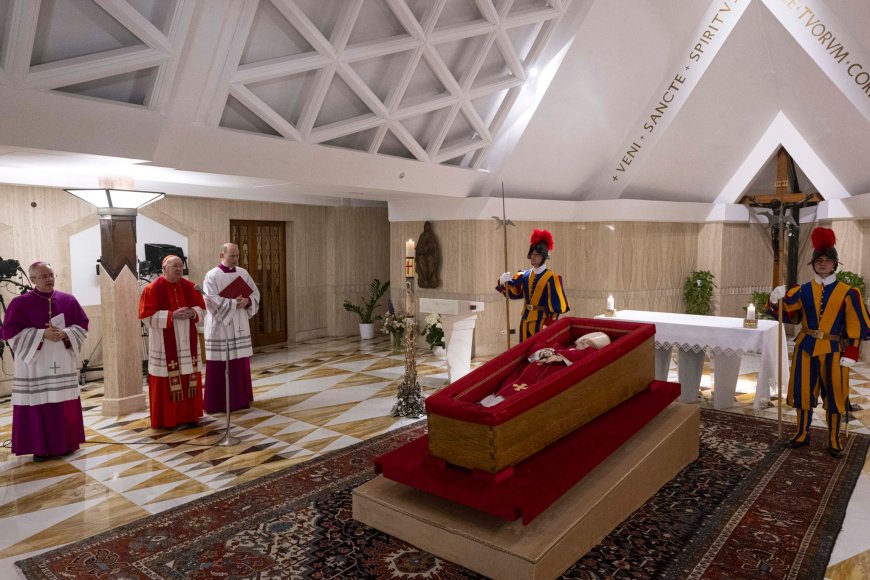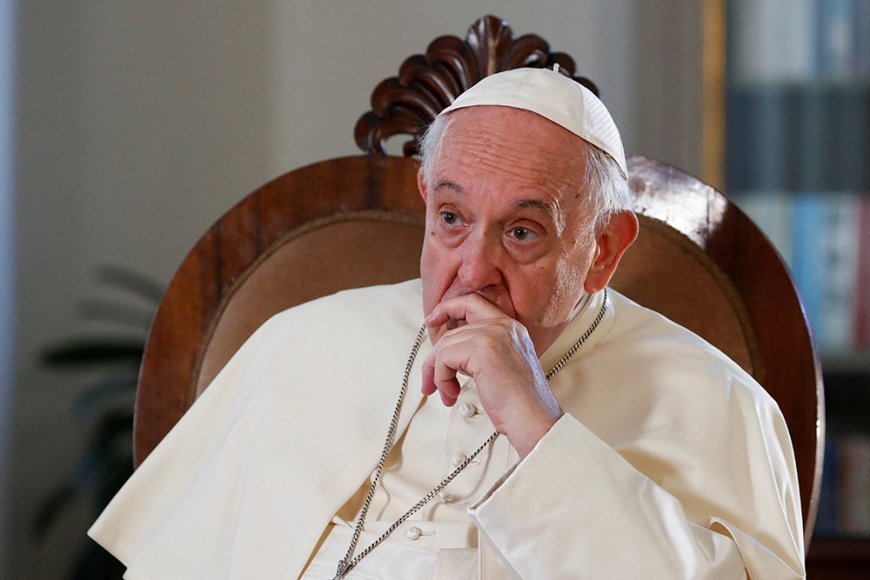Pope Francis' Message About Death In Upcoming Book
The late Pope contemplates how death marks the beginning of life’s journey into eternity.

Vatican News on Tuesday, April 22, shared details of a message the late Pope Francis had penned in early February 2025, contained in a book set to be made available in bookstores starting Thursday, April 24.
The Vatican Publishing House (LEV) published a preface penned by the late Pope Francis in early February for Cardinal Angelo Scola’s new book, Awaiting a New Beginning: Reflections on Old Age. In it, the late Pope contemplates how death marks the beginning of life’s journey into eternity.
"I read with emotion these pages born from the thought and affection of Angelo Scola, dear brother in the episcopate and a person who has held delicate roles in the Church, such as having been rector of the Pontifical Lateran University, later Patriarch of Venice, and Archbishop of Milan.
"First of all, I want to express my deep gratitude to him for this reflection that combines personal experience and cultural sensitivity in a way I have rarely encountered. One experience enlightens the other culture; the second gives substance to the first. In this happy interweaving, life and culture blossom with beauty," the preface read in part.

A photo of the late Pope Francis lying in state at the chapel of Santa Marta on Tuesday, April 22, 2025 in the Vatican. /VATICAN NEWS
The Pope, who died at the age of 88, urged readers not to be deceived by the short form of the book, warning of very dense pages to read and reread. From Angelo Scola’s reflections, he recalled gathering some particularly resonant points with what his own experience had taught him, among them being old age.
According to the Pope, "We must not be afraid of old age, we must not fear embracing becoming old, because life is life, and sugarcoating reality means betraying the truth of things. Restoring pride to a term too often considered unhealthy is a gesture for which we should be grateful to Cardinal Scola."
"Because to say “old” does not mean “to be discarded,” as a degraded culture of waste sometimes leads us to think. Saying “old” instead means saying experience, wisdom, knowledge, discernment, thoughtfulness, listening, slowness… Values of which we are in great need!," he added.
He was of the view on the manner in which one becomes old, saying "If we live this time of life as a grace, and not with resentment; if we accept the time (even a long one) in which we experience diminished strength, the increasing fatigue of the body, the reflexes no longer what they were in our youth — with a sense of gratitude and thankfulness — well then, old age too becomes an age of life which, as Romano Guardini taught us, is truly fruitful and capable of radiating goodness."
Pope Francis also captured Angelo Scola's highlighting of the human and social value of grandparents, adding that he has often emphasised how the role of grandparents is of fundamental importance for the balanced development of the young, and ultimately for a more peaceful society, noting that amidst the frenzy of societies, often devoted to the ephemeral and the unhealthy taste for appearances, the wisdom of grandparents becomes a shining beacon, shedding light on uncertainty and providing direction to grandchildren, who can draw from their experience something “extra” for their daily lives.
"The words that Angelo Scola dedicates to the theme of suffering, which often takes hold in becoming old, and consequently to death, are precious gems of faith and hope. In the reflections of this brother bishop, I hear echoes of the theology of Hans Urs von Balthasar and Joseph Ratzinger — a theology “done on one’s knees,” steeped in prayer and in dialogue with the Lord," he continued.
"This is why I said earlier that these are pages born “from the thought and the affection” of Cardinal Scola: not only from thought, but also from the emotional dimension, which is the one to which Christian faith points, since Christianity is not so much an intellectual act or a moral choice, but rather the affection for a person — that Christ who came to meet us and decided to call us friends."
Pope Francis drew from the conclusion of Scola's book, depicting a heartfelt confession of how he is preparing himself for the final encounter with Jesus, stating the certainty that "death is not the end of everything, but the beginning of something. It is a new beginning, as the title wisely highlights, because eternal life, which those who love already begin to experience on earth within the daily tasks of life, is beginning something that will never end."
"And it is precisely for this reason that it is a 'new' beginning, because we will live something we have never fully lived before: eternity," he continued.
Pope Francis' Final Testament
Meanwhile, details have surfaced regarding the late Pope’s spiritual testament, dated 29 June 2022, giving indications for his burial in the Basilica of Saint Mary Major. In his testament, Pope Francis requested that his tomb should be in the ground; simple, without particular ornamentation, bearing only the inscription: Franciscus.
“I wish my final earthly journey to end precisely in this ancient Marian sanctuary, where I would always stop to pray at the beginning and end of every Apostolic Journey, confidently entrusting my intentions to the Immaculate Mother, and giving thanks for her gentle and maternal care,” noted the testament.
“I ask that my tomb be prepared in the burial niche in the side aisle between the Pauline Chapel (Chapel of the Salus Populi Romani) and the Sforza Chapel of the Basilica, as shown in the attached plan,” it further added.
Pope Francis had arranged for his burial expenses to be covered by a donation from a benefactor, which he directed to be transferred to the Papal Basilica of Saint Mary Major. The responsibility for overseeing this was entrusted to Cardinal Rolandas Makrickas, the Extraordinary Commissioner of the Liberian Basilica.
The release of the Pope’s final testament was accompanied by official photographs of his body lying in state at the chapel of Saint Martha within the Vatican.

A photo of the late Pope Francis. /REUTERS
Honouring his personal wishes, the Pope’s body was placed in a simple wooden casket rather than a bier — the latter traditionally used in past papal funerals. He also opted out of the customary three-layer casket made of cypress, lead, and oak, requesting instead a plain wooden coffin with a zinc lining.
The Head of the Catholic Church passed away on Easter Monday, April 21, following a lengthy illness during which he suffered from double pneumonia for over a month. Vatican News later confirmed that the cause of death was a stroke, which led to a coma and ultimately, irreversible cardiac and circulatory failure.
Medical records also revealed that the Pope had a history of serious respiratory issues, including acute respiratory failure from bilateral pneumonia, multiple bronchiectases, as well as chronic conditions like hypertension and Type II diabetes.






